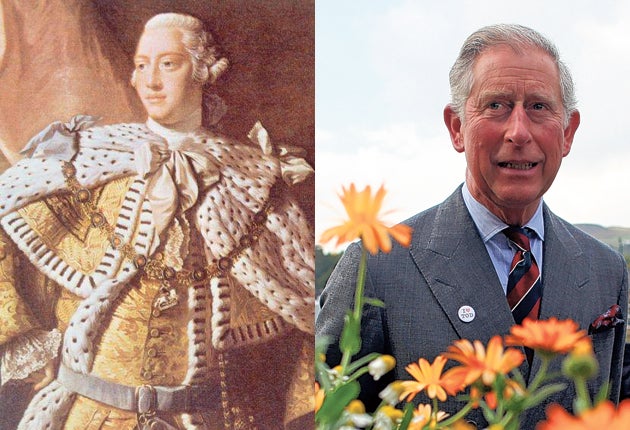Royal 'cuts' could make Charles the richest king in British history

The Queen is set to become one of the wealthiest crowned heads in Europe after the future of the British monarchy was secured in a historic deal with the Government that will give the House of Windsor a share of the £210m profits from government estates relinquished by George III.
The Civil List and the parliamentary system for funding the head of state are to be abolished, and from 2013, the Queen will receive her funding directly from the Crown Estate, which owns £6bn of British land and business. The deal means the Queen, and her successors, will not have to dip into her private wealth to help fund her crumbling palaces and staff wages, reducing financial concerns for Prince Charles when he ascends the throne, and potentially leaving him with a vast income.
George Osborne told Parliament yesterday he had reached agreement with the Royal Household on funding arrangements. But pro-democracy campaigners said it would leave the sovereign with "untold riches".
In the short term the Queen will be given no cash in addition to the annual £30m she receives from the Government each year to support her public functions and will be expected to rely on her reserve funds built up over the past 10 years to fill any shortfall. She will, however, be given £1m to pay for Diamond Jubilee celebrations in 2012.
Mr Osborne who, together with the Prime Minister, is a Royal Trustee for the Civil List, said he wanted to sort out the constitutional funding issue once and for all. He told MPs in his speech yesterday: "As I outlined at the Budget, the 10-year settlement expired this year and no provision for a new settlement had been made. Her Majesty graciously agreed to a one-year cash freeze in the Civil List for next year."
He said that the shortfall between what the Queen received each year in head of state expenditure and what she spent meant that Royal Household spending will "fall by 14 per cent in 2012-13 while grants to the Household will be frozen in cash terms". Outlining the start of the new deal he said: "After that the Royal Household will receive a new sovereign support grant linked to a portion of the revenue of the Crown Estate, so that my successors do not have to return to the issue so often."
Documents released to The Independent under the Freedom of Information Act revealed the growing tension between the Royal Household and ministers over the escalating public cost of the Royal Family. Buckingham Palace puts the annual cost of the monarchy at £38.2m, but that figure does not include security and other costs which put the bill closer to £180m per year.
Last night it was not clear how much of the £200m Crown Estate profits the monarch would be entitled to each year.
Republic, the group which campaigns for a more accountable Royal Family, described the new deal as "disgraceful". Its spokesman Graham Smith said: "We're seeing sweeping cuts to services provided for the poorest and most vulnerable in our society, yet no serious cuts are being implemented to bring down the cost of the Royal Household. Pegging royal funding to Crown Estate revenue makes no sense. Crown Estate revenue has always been there to provide funds for the government. Our Government must stop behaving as if we owe the Windsors a living. We don't."
A spokesman for the Queen said: "The Household obviously has some challenging times ahead, but we welcome the announcement of the sovereign support grant."
George III – The monarch who frittered away his wealth
Huge debts built up by the profligate George III forced him to hand over the income from his Crown lands, the Crown Estate, to Parliament in return for a fixed Civil List payment as well as profits from the Duchy of Lancaster. Debts amounting to over £3m (the equivalent to more than £200m by today's standards) over the course of George's reign were paid by Parliament, and the Civil List annuity was then increased from time to time. Each succeeding sovereign has renewed the arrangement made between George III and Parliament and the practice has, since the 19th century, been recognised as an integral part of the country's constitutional make-up which would be difficult to abandon.
Prince Charles – The future monarch with everything to gain
Under the new constitutional arrangement the monarch would once again have access to the huge profits of the Crown lands. This would alter the settlement agreed in 1760 which has seen all the profits from the newly named Crown Estate returned to the Treasury. The Estate is one of the world's biggest landowners and its tenants, mostly living in London, pay millions of pounds in rent each year. Their rent cheques will now go directly to pay for the head of state expenditure of the Queen and Prince Philip, and eventually Prince Charles when he ascends the throne. This year, the Crown Estate accounts revealed that its investments and property management returned profits of £210m.
Join our commenting forum
Join thought-provoking conversations, follow other Independent readers and see their replies
0Comments